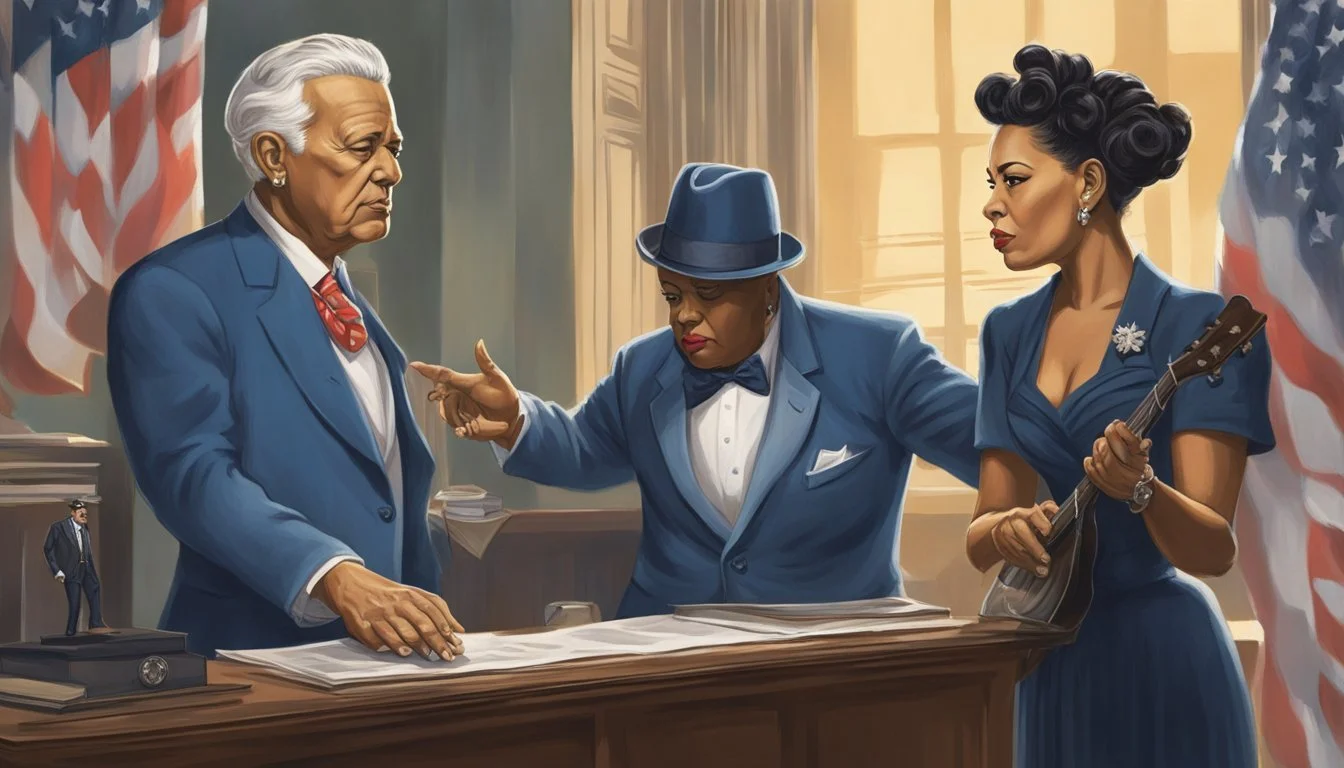Lady Day vs. Uncle Sam: The True Battle of 'The United States vs. Billie Holiday'
Exposing Government Persecution of a Jazz Icon
The 2021 biographical drama "The United States vs. Billie Holiday" sheds light on the legendary jazz singer's tumultuous battle against government persecution. Directed by Lee Daniels and starring Andra Day in a breakout performance, the film explores Holiday's later years and her defiant stance against racial injustice.
Billie Holiday's haunting rendition of "Strange Fruit" became a lightning rod for controversy, drawing the ire of federal authorities and sparking a relentless campaign to silence her voice. The song, originally a poem by Abel Meeropol, vividly depicted the horrors of lynching in the American South. Holiday's unwavering commitment to performing it made her a target of the FBI's war on drugs.
The film portrays Holiday's struggle with addiction alongside her artistic triumphs, offering a nuanced look at the intersection of personal demons and systemic oppression. Andra Day's powerful portrayal captures the essence of Lady Day, from her mesmerizing stage presence to her resilience in the face of unrelenting pressure from law enforcement.
Early Life and Rise to Fame
Billie Holiday's journey from a troubled childhood to becoming one of jazz's most iconic voices was marked by hardship and resilience. Her distinctive style and emotive performances would leave an indelible mark on American music and culture.
Becoming 'Lady Day'
Born Eleanora Fagan in 1915 in Philadelphia, Billie Holiday spent her early years in Baltimore. Her childhood was turbulent, marked by poverty and instability.
At 12, she moved to Harlem with her mother. Holiday worked various jobs, including as a maid in a brothel. She began singing in Harlem nightclubs as a teenager.
Her unique vocal style caught the attention of producer John Hammond. He gave her the nickname "Lady Day" and helped launch her recording career in 1933.
Musical Breakthrough and Cultural Impact
Holiday's breakthrough came in the mid-1930s with hits like "What a Little Moonlight Can Do" and "Easy Living." Her collaboration with saxophonist Lester Young further solidified her status in the jazz world.
In 1939, she recorded "Strange Fruit," a haunting protest song about lynching. This bold move established her as a voice for civil rights, despite potential career risks.
Holiday's autobiography "Lady Sings the Blues" was published in 1956. It detailed her struggles with substance abuse and discrimination, offering a raw glimpse into her life behind the music.
Her distinct vocal style, characterized by its emotional depth and innovative phrasing, influenced countless singers across genres. Holiday's impact extended beyond music, making her a cultural icon of resilience and artistic integrity.
The Heart of Controversy
Billie Holiday's powerful voice and bold lyrics challenged racial injustice in America. Her iconic song and the government's relentless pursuit of her exposed deep-rooted societal issues.
The Song 'Strange Fruit'
"Strange Fruit" became Billie Holiday's most famous and controversial song. Written by Abel Meeropol, a Jewish-American teacher, the lyrics vividly depicted the horrors of lynching in the South. Holiday's haunting performance brought attention to this brutal practice against Black Americans.
The song's impact was immediate and far-reaching. It sparked conversations about racial violence and became an anthem for the civil rights movement. Despite threats and pressure to stop performing it, Holiday continued to sing "Strange Fruit" throughout her career.
Many venues banned the song, fearing its provocative message. Yet its power endured, solidifying Holiday's role as a voice for justice and equality.
Federal Bureau of Narcotics and Harry J. Anslinger
Harry J. Anslinger, head of the Federal Bureau of Narcotics, targeted Billie Holiday relentlessly. He viewed her drug use and outspoken nature as threats to society. Anslinger's pursuit of Holiday was part of a larger campaign against jazz musicians and Black Americans.
The Bureau used undercover agents to gather evidence against Holiday. They arrested her multiple times for drug possession, disrupting her career and personal life. This harassment continued for years, taking a toll on Holiday's health and finances.
Anslinger's actions reflected the era's racial prejudices and the government's attempts to control cultural influences. The persecution of Holiday highlighted the intersection of drug policy, racism, and attempts to silence dissenting voices in American society.
Criminalization and Surveillance
Billie Holiday faced relentless persecution from law enforcement due to her drug use and provocative performances. The government's tactics included undercover operations and harsh legal consequences.
Billie Holiday's Addiction
Holiday struggled with heroin and alcohol addiction throughout her career. Her substance abuse issues made her vulnerable to legal troubles and manipulation. She was arrested multiple times on drug charges, often in humiliating public spectacles.
Holiday's drug use stemmed partly from childhood trauma and the pressures of fame. She first tried heroin in her early 20s. Despite attempts to quit, she battled addiction for most of her adult life.
The singer's drug dependence gave authorities a pretext to target her. They used narcotics laws to harass and imprison Holiday, viewing her as a threat due to her protest songs.
The FBI and Jimmy Fletcher
The FBI closely monitored Holiday as part of its campaign against supposed subversives in the entertainment industry. They assigned Jimmy Fletcher, a Black agent, to infiltrate her inner circle.
Fletcher initially arrested Holiday on drug charges in 1947. He later expressed regret for his role in persecuting her. The FBI used Fletcher to gather intelligence on Holiday's activities and associates.
Agents constantly surveilled Holiday's performances and private life. They tapped her phones, read her mail, and pressured venues to cancel her shows. This intense scrutiny took a heavy toll on the singer's mental health and career.
Significant Relationships
Billie Holiday's personal and professional relationships profoundly shaped her life and career. Her romantic entanglements and musical collaborations both supported and challenged her throughout her tumultuous journey.
Romance and Marriage
Billie Holiday's love life was marked by passionate but often troubled relationships. She married trombonist Jimmy Monroe in 1941, but their union was short-lived. Louis McKay became her third and final husband in 1957. Their relationship was volatile, with McKay acting as both her protector and exploiter.
Holiday also had a close bond with actress Tallulah Bankhead. Their friendship sparked rumors of a romantic involvement, though the exact nature of their relationship remains debated by historians.
Joe Guy, a trumpeter, was another significant romantic partner. Their relationship was complicated by their shared drug addiction, which ultimately contributed to their separation.
Professional Partnerships
Lester Young, the renowned saxophonist, was one of Holiday's most important musical collaborators. Their artistic connection was so strong that Young gave Holiday her famous nickname "Lady Day."
Joe Glaser served as Holiday's manager for many years. While he helped advance her career, their relationship was complex, with Glaser sometimes prioritizing financial gain over Holiday's well-being.
John Levy, a bassist and manager, briefly managed Holiday's career in the early 1950s. Their professional relationship was short but impactful during a crucial period in her life.
Legacy and Representation in Media
Billie Holiday's impact extends far beyond her musical contributions. Her courageous stance against racial injustice and her enduring influence on jazz have solidified her status as a cultural icon.
Influence on Civil Rights and Music
Billie Holiday's performance of "Strange Fruit" became a powerful anthem for the Civil Rights movement. The song's haunting lyrics about lynching in the American South brought widespread attention to racial violence.
Holiday's unique vocal style revolutionized jazz singing. Her emotive phrasing and ability to convey deep emotion inspired generations of vocalists across genres.
Her battles with addiction and legal troubles did not diminish her artistic legacy. Instead, they highlighted the systemic challenges faced by Black artists in mid-20th century America.
Portrayal in 'The United States vs. Billie Holiday'
The 2021 film "The United States vs. Billie Holiday" brought renewed attention to Holiday's life and struggles. Directed by Lee Daniels, the movie focuses on the government's targeting of Holiday for her performance of "Strange Fruit."
Andra Day's portrayal of Holiday earned critical acclaim. Her performance won a Golden Globe and garnered an Academy Award nomination for Best Actress.
The film, based on Johann Hari's book, emphasizes Holiday's role as a Civil Rights hero. It depicts her defiance in the face of government persecution and her commitment to performing "Strange Fruit" despite the risks.
Screenwriter Suzan-Lori Parks crafted a narrative that explores Holiday's complexity. The film portrays her as both a troubled individual and a courageous artist fighting against injustice.
Critical Reception and Sociocultural Impact
"The United States vs. Billie Holiday" sparked discussions about historical accuracy and modern relevance. Critics and audiences debated the film's portrayal of Holiday's life and its connections to contemporary social issues.
Analysis of Biopic's Accuracy
The film received mixed reviews from critics. Rotten Tomatoes reported a 55% approval rating, while Metacritic assigned a score of 52 out of 100. Some praised Andra Day's performance as Holiday, calling it remarkable and transformative.
Critics debated the film's historical accuracy. Many noted that it drew heavily from Johann Hari's book "Chasing the Scream" rather than relying solely on established Holiday biographies. This choice influenced the film's focus on Holiday's struggles with the federal government.
Some reviewers on "Popcorn with Peter Travers" highlighted the film's emphasis on Holiday's activism through her music, particularly "Strange Fruit."
The Relevance of Holiday's Story Today
The film's release coincided with renewed interest in civil rights issues, including the Black Lives Matter movement. This timing amplified discussions about systemic racism and government overreach.
Holiday's battle against racist policies resonated with modern audiences. Her persecution for performing "Strange Fruit" drew parallels to contemporary debates about artistic freedom and social commentary.
The film sparked conversations about the ongoing war on drugs and its disproportionate impact on communities of color. It highlighted how Holiday's struggles with addiction were weaponized against her by authorities.
Educators and activists used the film to discuss the historical roots of current social justice movements. Holiday's story served as a bridge between past and present civil rights struggles.
Billie Holiday's Artistry
Billie Holiday's unique vocal style and captivating performances cemented her status as one of jazz's most influential figures. Her artistry extended beyond her voice, encompassing powerful interpretations and collaborations that shaped the genre.
Vocal Style and Performance
Holiday's distinctive voice was marked by its raw emotion and unconventional phrasing. She possessed a remarkable ability to convey deep feeling through subtle vocal inflections and timing. Her performances were characterized by an intimate, conversational quality that drew listeners in.
Holiday's interpretative skills allowed her to breathe new life into familiar songs. She often altered melodies and rhythms to suit her expressive needs, creating unique renditions of popular tunes.
On stage, Holiday exuded a magnetic presence. Her performances were marked by an air of vulnerability mixed with quiet strength, captivating audiences across the nation.
Enduring Influences and Collaborations
Holiday's artistic partnerships shaped her career and the jazz landscape. She worked with renowned musicians like Lester Young, with whom she developed a deep musical connection. Their collaborations produced some of jazz's most memorable recordings.
Her influence extended to future generations of singers, including Frank Sinatra and Nina Simone. Many artists have cited Holiday as a major inspiration for their own vocal approaches and performance styles.
Holiday's courage in tackling controversial subjects through her music, particularly with "Strange Fruit," showcased her commitment to using art as a form of social commentary. This bold approach inspired later artists to address important issues in their work.




